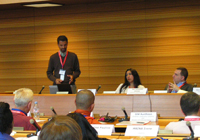 The faith community makes a major
The faith community makes a major
contribution to the worldwide response to
AIDS, especially in poorer developing
countries, where faith-related facilities may
be the sole source of health assistance. Seventy percent of the world’s population identify themselves as members of a faith community, which situates communities of faith in a privileged position to influence people’s behaviour and attitudes, even in relationship with the AIDS epidemic.
Organizations motivated by religious faith - often called Faith-based organizations (FBOs) - have been involved in the AIDS response since the earliest days of the epidemic and have often been among the first to respond, providing services, education and care.
UNAIDS in collaboration with UNFPA, WHO, ILO and UNDP will bring together a working group of partnership officers from across the UNAIDS Secretariat and Cosponsor organizations and FBO representatives to outline a strategy for future work with faith-based organizations on AIDS issues. The meeting, which will take place from 9 – 11 April in Geneva, will aim to establish a strategy for a more coordinated response to partnership work among all stakeholders involved in the AIDS response.
Religious communities, mosques, temples, churches, hospitals and clinics have reached out to provide support to those living with and affected by HIV. Many have been involved in the response since the earliest days of the epidemic. Their leadership has great influence in the lives of many people, and leaders speaking out responsibly about AIDS can make a powerful impact at both community and international level.
 Participants will analyse how to best work
Participants will analyse how to best work
with the wide range of FBOs working on
AIDS, discussing the opportunities and
challenges that they offer. However the response of the religious community can also be negative. People living with HIV have been stigmatized by religious leaders and communities of faith. Approaches to HIV prevention methods and attitudes towards people at increased risk of HIV infection such as men who have sex with men, have sometimes hindered the response. Much work remains to be done to eradicate stigma and discrimination.
The faith community makes a major contribution to the worldwide response to AIDS, especially in poorer developing countries, where faith-related facilities may (in some areas) be the sole source of health assistance. The ARHAP/WHO report (2007) found that faith-related organizations were providing 33 to 40 percent of all HIV health care and treatment services in Zambia and Lesotho, and calculated that between 30 and 70 percent of all healthcare infrastructure across the continent is operated by faith-based groups.
Furthermore, it is clear that faith communities are ideally placed to respond in the broadest way to the epidemic’s challenges, not just as providers of services but also (and perhaps most importantly) as networks and movements that reach right to the heart of community and family life. This makes them key players in a holistic, multifaceted, integrated response to AIDS. It is for this reason that UNAIDS is currently exploring a deeper engagement with ‘faith-based organizations’.
Participants at this meeting will analyse how to best work with the wide range of FBOs working on AIDS, discussing the opportunities and challenges that they offer. The working group will produce a three to five years strategy that will guide the UNAIDS and its cosponsors efforts to consolidate a coordinated response to AIDS with the faith community.





